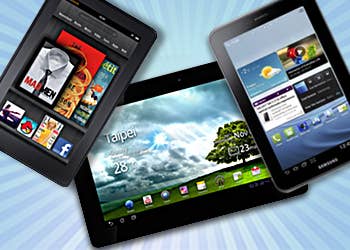Are Android tablets a worthy market for games?
At the Mobile Gaming USA conference, analyst David Cole poses the question
At the Mobile Gaming USA conference in San Francisco today, David Cole of of analyst firm DFC Intelligence moderated a panel discussing the future of Android tablets and gaming. Panelists included Rick Marazzani, Head of Content Programming for Exent, the number one Games on Demand provider; Chris Petrovic, General Manager, GameStop Digital Ventures; and Chris Tanquary, Product Manager, gaming and music, Samsung.
David Cole asked the overall question: "Is the Android tablet market a worthwhile investment of your time and resources?" He cited some impressive facts about iPad numbers; 40 million iPads were sold in 2011, compared to the Nintendo DS in its best year which sold 32 million. Android tablets have yet to reach more than a small fraction of those numbers, though Cole predicts that Android tablets will pass iPad tablets in the next few years, in terms of users. "The issue has always been fragmentation, and that Android tablets are only monetizing at about twenty percent the rate of iPads." Are Android tablets a worthy market yet?
Chris Petrovic of GameStop said that their primary audience is the core gamer, "the real whales of gaming," as he put it. "We saw the tablet as a complementary experience for our customers," Petrovic said. "They are spending more and more time gaming on different devices at the expense of other experiences."
Chris Tanquary of Samsung agrees about the importance of tablets. "We see a lot of people sitting on the couch watching tv and surfing the web on their tablets," said Tanquary. "The tablet is going to be the hub of everything that goes on in your home. Your climate, your refrigerator, everything." There is a lot interest in Samsung in tablets on the enterprise side, too.
"The tablet is going to be the hub of everything that goes on in your home"
Chris Tanquary
Petrovic noted that "These tablets will very quickly have prior gen console power. To what extent will it just repeat those devices?" He went on to say, "Our folks are staying true to their primary platforms but extending the experience across multiple tertiary platforms. This is somewhere between the five minute snack time game on your phone and the four hour fragfest on your console."
David Cole asked if tablets are direct competitors to the Nintendo 3DS and the PSVita, and Petrovic was quick to respond: "I see tablets as competitors to anything that is portable," he said. This is a reasonable view given the number of tablets being sold and the fact that gaming is the number one use for tablets, second only to internet access.
Chris Tanquary provided some clues to Samsung's future directions. "One thing we learned from Apple is that content matters," he said. "That is something we realize, and that is why you see us diving into the ecosystems." Tanquary went on to explain: "One thing we try to do is to bring a lot of content that is not published yet, often because many publishers don't like the amount of piracy on Android." He feels that more and more games will be brought to the Android platform. "We are hearing there is a lot of parity between the two platforms, and many publishers are doing both iOS and Android at the same time," he noted.
Petrovic said that it's not just features and content, but that price matters too. "If you put out a tablet that is priced at parity with an iPad you are losing, because that ship has sailed," Petrovic stated. He feels that tablets have to offer something that Apple doesn't; either a lower price like the Kindle Fire or some other features."Windows 8 tablets can play PC games right out of the box," Petrovic said. But the price of Windows 8 tablets is an issue; he feels it will be fairly high due to Microsoft's licensing fees, which may hurt acceptance.
"Consumers are not afraid to pay for good quality content"
Chris Petrovic
Rick Marazzani noted that Android tablets can be subsidized, like the Kindle Fire, so that is helping get devices into people's hands. "The carriers are a very small part of the tablet market right now," Marazzani said. Cole noted that the Android market is very fragmented, so it seems there is a lot of opportunity to create a branded place for consumers to go. "How do you funnel consumers to the good stuff?," asked Cole. Marazzani answered simply, "We curate. We only have 200 games, and that's going to grow, but I don't think there is more than 200 great games in the market." Making sure that users only see good games is vital to creating a good experience, he believes.
Cole wondered if the abundance of free Android games is destroying the ability of publishers to charge for games. "Are you seeing a willingness for consumers to fork out for the more expensive content?," asked Cole. Petrovic replied, "Consumers are not afraid to pay for good quality content. It is not going to be a console price point, but it will be ten or fifteen dollars for the initial game plus additional content," he said. "I think Amazon is a really credible competitor in this space. People like a ready made ecosystem, it is easy, intuitive and cheap." The challenge for other Android tablet makers is to come up with a similar ecosystem to Amazon, and that won't be a simple task.

